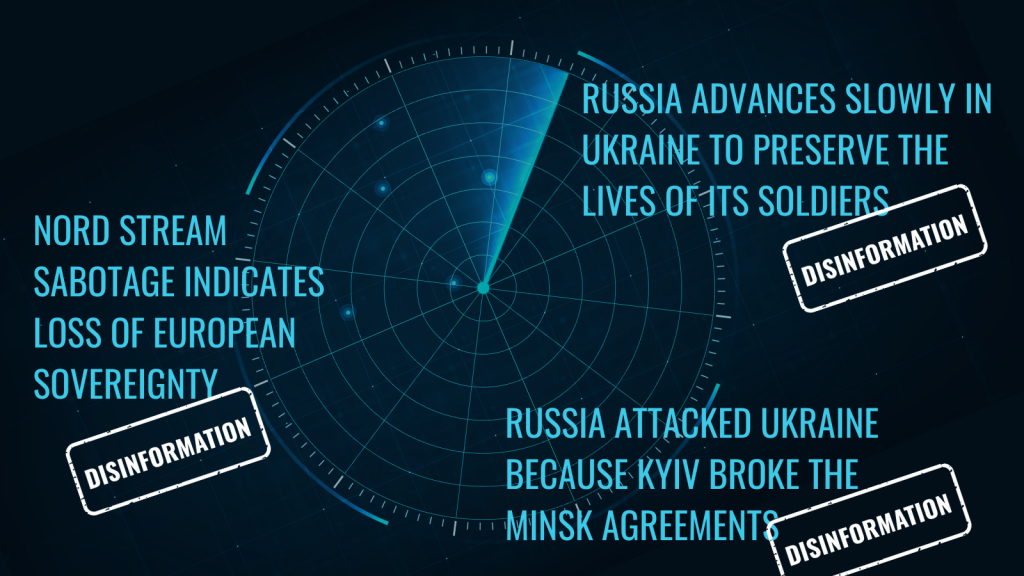By EUvsDisinfo
Pro-Kremlin disinformation praises Russia’s real or imaginary friends, attempts to placate people at home, distracts from Russia’s quagmire in Ukraine, blames the West for all the worlds’ ills, and spews conspiracy theories and doomsday prophecies.
As Russia’s war of aggression against Ukraine continues, pro-Kremlin disinformation outlets are desperate to diversify their palate with any topics that could draw the focus away from Russia’s quagmire in Ukrainian territory. The world is seized by uncertainty and the Kremlin seeks to exploit these tumultuous times to spread its disinformation, distractions, and deceit.
This week, we can narrow down the Kremlin’s disinformation stories to two main axioms. First, life in Russia is better than ever and it is surrounded by friends who unflinchingly support the Kremlin. Second, everything that the ‘evil West’ touches turns to dust. Hence, its downfall is inevitable.
Courtship in the Far East
As is customary for any autocratic regime, every step its ‘glorious leader’ takes deserves undivided attention and praise. Pro-Kremlin outlets coverage of Putin’s two-day courtship trip to China was emblematic of this very approach. It received broad coverage, focussing on the ‘no limits’ partnership between Russia and China. However, for the Kremlin, this was also an opportunity to push the disinformation trope of Russia as a peace-loving nation that pretends to be concerned about ‘finding a solution’ in Ukraine.
Of course, they also did not miss the chance to sing the praises of their ‘no limits’ partner. But, when your friends are few and far in between, one must make do with whomever is still left in the room. And perhaps more for domestic consumption, to distract from the freefall of the Russian economy, most pro-Kremlin outlets lauded the record exports of natural gas and oil to China.
With all the pomp and circumstance of Putin’s China trip, Russian Foreign Minister Lavrov’s visit to another dear friend in the Far East almost went unnoticed. Almost. Some pro-Kremlin outlets did pick up on the trip to North Korea, echoing similar praises for a ‘new level of partnership’ while emphasising the ‘strategic role’ of the DPRK for Russia. Once again, similar to the earlier engagement between Putin and Kim Jong-Un, pro-Kremlin pundits focussed on pushing the message that a Russian-North Korean partnership is a serious headache for the West and will ultimately be its undoing.
All is well on the home front
The escapades of Russian leaders treading red carpets in the Far East were closely related to the doubling down on the message that life in Russia is great, despite the sanctions imposed against Russia. These disinformation-laded messages about the alleged ineffectiveness of sanctions are a clear attempt to prepare Russian domestic audiences for the next round of EU sanctions, currently in the making. If these sanctions really did not bite, why such an urgent need to talk about them?
In a similar line of denialism and wishful thinking, pro-Kremlin outlets continued to spare their consumers any truthful news about the situation in Ukraine, instead focussing on praising Putin and the Russian military leadership while dismissing previously dreaded deliveries of ATACMS as inconsequential. It would seem that the ‘red lines’ drawn by the Kremlin are often merely a faint shade of pink.
Tired puppet master conspiracies
Since distraction and disinformation recycling were the themes of the week for pro-Kremlin pundits, it came as no surprise that another tired old pro-Kremlin disinformation trope depicting philanthropist and financier George Soros as an evil puppet master came to light once again. This is a real déjà vu moment for us, since the EUvsDisinfo database is full of similar accusations of Soros’ alleged meddling all across the Eastern Partnership region.

This time, Armenia was on the receiving end, when the notorious pro-Kremlin outlet Perviy Kanal ‘exposed’ the alleged links between Armenian authorities and Soros. Needless to say, such a fabricated and tendentious TV show by an outlet already subject to EU sanctions triggered a strong reaction by Armenian authorities.
Blame the West. Again. And again.
No week would be complete for the pro-Kremlin disinformation bubble without some good old-fashioned blaming the West for all the worlds’ ills. Pro-Kremlin pundits were quick to make the connections between Ukraine and the escalating situation between Israel and the Hamas, and place the blame squarely on the West. This follows a long line of unfounded accusations against Western governments for alleged war mongering . As a rule, this narrative is juxtaposed by lofty claims of Russia’s undying commitment to global peace and stability.
In this context, some pro-Kremlin pundits were very keen to push the narrative that Western interest in Ukraine is disappearing. Once again, this disinformation claim is merely an adaptation of an often-used pro-Kremlin disinformation trope that the West is abandoning Ukraine. They’ve been singing the same tune at least since 2014, and yet the West still stands steadfast alongside Ukraine.
The curious case of wishful thinking
Finally, in line with the two axioms outlined earlier, pro-Kremlin outlets also exhibited a textbook case of wishful thinking by disproportionately focussing on any real or imagined crack in Western unity. Most recently, the EU-US summit in Washington fell under their tedious scrutiny as they looked to showcase any perception of divergence between US and EU positions vis-à-vis Ukraine and the Middle East. Pro-Kremlin disinformation pundits’ conclusions about the summit were uninspired to say the least – the West is running out of steam to support Ukraine, hence the latter’s economy and statehood will inevitably collapse. An odd conclusion indeed , considering the unprecedented support that the US and the EU continue to provide to Ukraine.

Also blinking on EUvsDisinfo’s radar:
- The Kremlin’s disinformation agents have once again resorted to recycling old falsities, such as the absurd claim that Russia advances slowly in Ukraine to preserve the lives of its soldiers. In fact, depictions of the Russian military leadership as humanitarian started already in the late spring of 2022, when it was evident that Ukraine would not surrender to Russian aggression and simply roll over. It is difficult to ascertain the real numbers of losses for the Russian army, since Russia does not disclose any reliable information on this matter. However, Russian infantry attacks in Ukraine are often reckless and carried out by poorly trained and ill-equipped personnel, which clearly contradicts this notion of preserving the lives of Russian soldiers.
- As the security of critical undersea infrastructure is once again in the media spotlight, some pro-Kremlin outlets are linking the Nord Stream pipeline sabotage with the pro-Kremlin disinformation trope of ‘lost European sovereignty’. Pro-Kremlin outlets often portray European states as vassals, puppet-states, or colonies of the US. However, the EU Member States are sovereign countries and make sovereign decisions about their own internal, economic, foreign, and security policies.
- Continuing the established pro-Kremlin practice of disinformation recycling, some outlets reached back even further and parroted the well-debunked narrative that Russia attacked Ukraine because Kyiv broke the Minsk agreements. In truth, Putin’s decision to invade Ukraine had nothing to do with any adherence to or contravention of these agreements. In fact, since the beginning of the war, the Kremlin has given myriad and sometimes mutually contradictory ‘reasons’ of the invasion. Needless to say, none are substantiated by any facts.
By EUvsDisinfo





